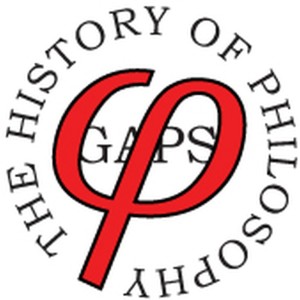Episodes

Sunday Feb 02, 2025
HoP 462 Freedom to Philosophize: Introduction to Early Modern Philosophy
Sunday Feb 02, 2025
Sunday Feb 02, 2025
What is Enlightenment, anyway?

Sunday Dec 08, 2024
HoP 458 - Outsider Philosophy - The Cheese and the Worms
Sunday Dec 08, 2024
Sunday Dec 08, 2024
Carlo Ginzburg’s innovative historical study The Cheese and the Worms looks at the ideas of an obscure 16th century miller, suggesting how popular culture might be integrated into the history of philosophy.

Sunday Oct 27, 2024
HoP 455 - Tom Pink on Francisco Suárez
Sunday Oct 27, 2024
Sunday Oct 27, 2024
We're joined by Tom Pink, who tells us about Suárez on ethics, law, religion, and the state.

Sunday Sep 01, 2024
HoP 451 - Could’ve, Would’ve, Should’ve - Free Will in the Second Scholastic
Sunday Sep 01, 2024
Sunday Sep 01, 2024
What was Luis de Molina trying to say about human free will with his doctrine of “middle knowledge,” and why did it provoke such controversy?

Sunday Jun 09, 2024
HoP 447 - Andrés Messmer on Spanish Protestantism
Sunday Jun 09, 2024
Sunday Jun 09, 2024
Yes, there were Spanish Protestants! Andrew (Andrés) Messmer joins us to explain how they drew on humanism and philosophy to argue for their religious agenda.

Sunday Mar 17, 2024
HoP 441 - Lambs to the Slaughter - Debating the New World
Sunday Mar 17, 2024
Sunday Mar 17, 2024
Bartholomé De las Casas argues against opponents, like Sepúlveda, who believed that Europeans had a legal and moral right to rule over and exploit the indigenous peoples of the Americas.

Sunday Feb 18, 2024
HoP 439 - Cancel Culture - The Inquisition
Sunday Feb 18, 2024
Sunday Feb 18, 2024
How religious persecution and censorship shaped the context of philosophy in Catholic Europe in the sixteenth century.

Sunday Oct 01, 2023
HoP 429 - She Uttereth Piercing Eloquence - Women’s Spiritual Literature
Sunday Oct 01, 2023
Sunday Oct 01, 2023
How women’s writing in England changed from the early fifteenth century, the time of Margery Kempe, to the late sixteenth century, the time of Anne Lock.

Sunday Sep 03, 2023
HoP 427 - Brave New World - Shakespeare’s Tempest and Colonialism
Sunday Sep 03, 2023
Sunday Sep 03, 2023
Can Shakespeare’s Tempest be read as a reflection on the English encounter with the peoples of the Americas?

Sunday Jul 09, 2023
HoP 425 - Patrick Gray on Shakespeare
Sunday Jul 09, 2023
Sunday Jul 09, 2023
We're joined by Patrick Gray to discuss Shakespeare's knowledge of philosophy, his ethics, and his influence on such thinkers as Hegel.

Sunday May 28, 2023
HoP 422 - The World’s Law - Richard Hooker
Sunday May 28, 2023
Sunday May 28, 2023
Richard Hooker defends the religious and political settlement of Elizabethan England using rational arguments and appeals to the natural law.

Sunday Apr 09, 2023
HoP 418 - Diarmaid MacCulloch on the British Reformations
Sunday Apr 09, 2023
Sunday Apr 09, 2023
A leading expert on the history of the Reformation joins us to explain the very different stories of England and Scotland in the 16th century.

Sunday Mar 12, 2023
HoP 416 - God’s is the Quarrel - The English Reformation
Sunday Mar 12, 2023
Sunday Mar 12, 2023
The historical context of English philosophy in the sixteenth century, with particular focus on Thomas Cranmer, and the role of religion in personal conscience and social cohesion.

Sunday Dec 04, 2022
HoP 409 - One to Rule Them All - Jean Bodin
Sunday Dec 04, 2022
Sunday Dec 04, 2022
The polymath Jean Bodin produces a pioneering theory of political sovereignty along the way to defending the absolute power of the French king.

Sunday Nov 20, 2022
HoP 408 - Constitutional Conventions - the Huguenots
Sunday Nov 20, 2022
Sunday Nov 20, 2022
Protestant French thinkers like François Hotman and Theodore Beza propose a radical political philosophy: the king rules at the pleasure of his subjects.

Sunday Nov 06, 2022
HoP 407 - Maria Rosa Antognazza on Early Modern Toleration
Sunday Nov 06, 2022
Sunday Nov 06, 2022
An interview on the nature of religious tolerance, and the forms it took during the Reformation and in the thought of early modern thinkers like Locke and Leibniz.

Sunday Oct 23, 2022
HoP 406 - Believe at Your Own Risk - Toleration in France
Sunday Oct 23, 2022
Sunday Oct 23, 2022
Even as wars of religion in France prompt calls for toleration, hardly anyone makes a principled case for freedom of conscience… apart from Sebastian Castellio.

Sunday Jun 19, 2022
HoP 399 - Seriously Funny - Rabelais
Sunday Jun 19, 2022
Sunday Jun 19, 2022
In his outrageous novel about Pantagruel and Gargantua, Rabelais engages with scholasticism, humanism, medicine, the reformation, and the querelle des femmes.

Saturday Mar 12, 2022
HoP 392 - John Sellars on Lipsius and Early Modern Stoicism
Saturday Mar 12, 2022
Saturday Mar 12, 2022
John Sellars returns to the podcast to discuss Lipsius' work on Seneca and the early modern Neo-Stoic movement.

Sunday Feb 27, 2022
Sunday Feb 27, 2022
Justus Lipsius draws on Seneca and other Stoics to counsel peace of mind in the face of political chaos, but also writes a work on how such chaos can be avoided.

